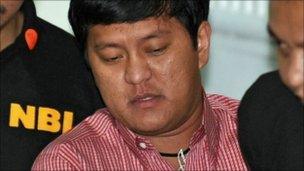Philippine clan accused of new atrocities in report
- Published

Andal Ampatuan Jnr belongs to the powerful clan in southern Maguindanao province
The Philippine government should investigate new claims of killings, abductions and sexual violence against a powerful southern family, Human Rights Watch says in a new report.
Some members of the Ampatuan clan are awaiting, or are on trial, for the massacre of 57 civilians last year.
But HRW says those killings were just an extreme example of violence, external linked to the clan going back several decades.
It said people were coming forward with fresh allegations of atrocities.
It is now nearly a year since 57 unarmed civilians were stopped by a group of gunmen, taken to an isolated spot and murdered.
The Maguindanao massacre shocked the nation.
The main suspects are members of the Ampatuan family, who ruled this area like their own personal fiefdom.
They are now on or awaiting trial, and deny all the accusations against them.
But since the killings, other people have come forward to say that they, too, suffered under the Ampatuans - people like the Abdulrashid family.
They have been in hiding for the past eight years, and spoke exclusively to the BBC.
"They killed one of my brothers with a chainsaw. I was told he was lying on the ground. My other brother was stabbed and then shot at, and then they hung him on a tree.
"They were killed by the Ampatuans."
The incident happened in 2002. Asked why the Abdulrashid family had not come forward before now, the brother replied: "Because while the Ampatuans were still in power, you couldn't complain when they abused you, because otherwise you would be killed."
James Ross, the legal and policy director at Human Rights Watch, says the boys' deaths were just two of many over a 20-year period.
"The Maguindanao massacre was an atrocity waiting to happen. We looked at more than 50 incidents where the Ampatuans and their private army were involved in killings, abductions, torture, sexual violence," Mr Ross said.
The report urges the Philippine government to investigate all the claims against the Ampatuan clan - not just the Maguindanao massacre.
And it also calls for the more than 100 private armies owned by other powerful families to be abolished.
- Published24 June 2010
- Published8 September 2010